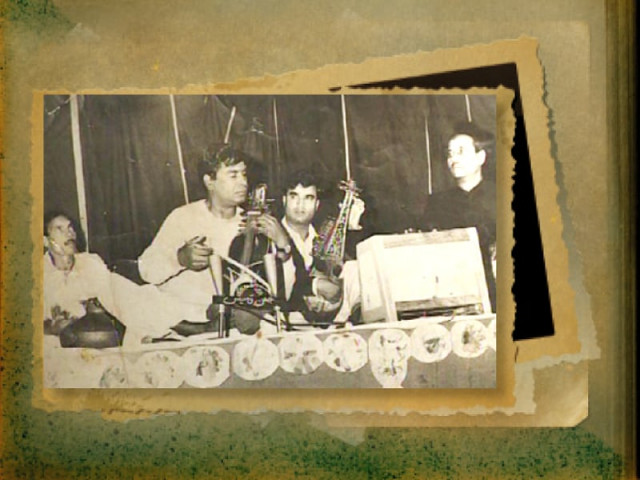Cultural heritage: Last patron of sarinda struggles to keep strings resonating
Unfortunately for Ijaz, like his father Munir, he has received no patronage from the state or the private sector.

Munir Sarhadi (centre) playing the sarinda. PHOTO COURTESY: IJAZ SARHADI
The art of playing the bowed lute – sarinda – is dying. And Ijaz Sarhadi, the last patron from a family of Sarinda players, is struggling to keep the instrument alive in Pakistan.
His grandfather, Ustad Pazeer Khan, was a skilled player, but had to work at All India Radio to earn a ‘real living’.
Pazeer Khan and his family of sarinda players from Khyber-Pakhtunkhwa (K-P) expected his son, Munir Sarhadi, to follow suit and spend his life learning to play the stringed instrument.
At first, Munir played the rebel and only started playing the sarinda much later – after his father refused to teach him.
Munir went on to become a sarinda virtuoso and earned national recognition. But he died a poor man, with no patronage from the state, and bequeathed his knowledge and love for the instrument to his son, Ijaz Sarhadi.
Ijaz has devoted his life to the sarinda and now, at the age of 45, is a skilled musician.
He, however, worries there would be no one to keep the family’s heritage alive after his death. He says his children are not interested in learning the instrument which requires years of training, rigorous daily practice and does not bring any material gain.
But the determined maestro has not given up, and is trying to force one of his sons to pick up the instrument.
Ijaz gets tearful as he recounts his son’s words: “What has this profession given us other than starvation? No one’s interested in encouraging the art.”
When asked what motivates him to keep playing the sarinda, he responded: “It gives me spiritual satisfaction when I play and that’s what I play for.”
But at the same time, Ijaz is clearly dejected by the lack of support from institutions like the Ministry of Information and Broadcasting and the Sarhad Tourism Corporation.
Things are slightly better for him outside K-P – Ijaz is recognised in various sectors related to the music industry.
Recently, Lok Virsa, the National Institute of Folk & Traditional Heritage in Islamabad sent him to the United Kingdom to attend a celebration in honour of William Shakespeare. Ijaz felt this was a great honour for him.
But in his hometown, Peshawar, no one wants to listen. With a heavy heart, Ijaz is shifting from Peshawar to Quetta, where he finds his art is more appreciated.
Clearly motivated to nurture art in Pakistan, Ijaz speaks out against the destruction of art and culture, something he finds truly ‘vulgar’, rather than nudity or women dancing.
“With the destruction of historical art, a nation loses its identity. How can a person explain who he is and what his national roots are when art is destroyed?” questioned the distraught artist.
“Music speaks to individuals – when a person is moved by art and welcomes music, it changes their outlook towards what is creative and important.”
In addition to promoting the sarinda, Ijaz wants to inspire modern composers in the Pakistani music industry. Rich musical traditions should be discovered, and Ijaz desires to introduce these traditions to fresh talent.
Unfortunately for Ijaz, like his father Munir, he has received no patronage from the state or the private sector. He does not have the economical means to reach out and inspire people with his music, and in the process, ensure the strings of his sarinda do not cease to reverberate after him.
Published in The Express Tribune, February 9th, 2013.













COMMENTS
Comments are moderated and generally will be posted if they are on-topic and not abusive.
For more information, please see our Comments FAQ